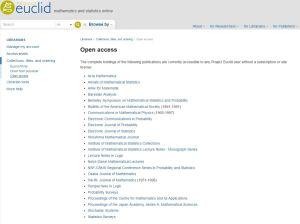We have created a series of five blog posts covering open access at Duke University Press. Today’s post features Project Euclid, a not-for-profit hosting and publishing platform for the mathematics and statistics communities, managed jointly by Cornell University Library and Duke University Press. Here Leslie Eager, Director of Publishing Services for Project Euclid, shares more about the platform and the ways it supports open access in the mathematics and statistics world.
 Our goal at Project Euclid is to make mathematics and statistics publications easy and affordable to find and read online. Supporting open-access publishing is a huge part of that mission. About 70% of Project Euclid is open access.
Our goal at Project Euclid is to make mathematics and statistics publications easy and affordable to find and read online. Supporting open-access publishing is a huge part of that mission. About 70% of Project Euclid is open access.
With Project Euclid the idea is to provide low-cost but feature-rich hosting services for journals, books, and conference proceedings so that publishers can keep the scholarship affordable and widely available to libraries and researchers while sustaining themselves financially. We partner with math and stats publishers around the world.
Some editors of open-access journals ask us why they should work with a formal publishing platform at all. It’s true that anyone can post articles on a web page at little or no cost, but it’s much harder for readers to discover those articles. Journals hosted on Euclid are fully indexed, compatible with library discovery systems, tagged with Mathematics Subject Classifications, search-engine-optimized, and linked directly to crucial mathematics resources like MathSciNet reviews, zbMATH, and arXiv.
We work with subscription-based publications as well as open access, but we offer special low pricing to publications with no access restrictions. We also encourage publishers to make their subscription-based content freely available after three to five years. The result is that across the 87 titles that we host, over 70% of the pages on Project Euclid are freely available to everyone.
Exciting opportunities
 It’s very exciting when long-standing, highly regarded journals find ways to open their content and become more easily available. Beginning in 2017, Acta Mathematica and Arkiv för Matematik will become open access and will be hosted on Project Euclid with issues going back to 1882. Both are high-quality journals (published by the Institut Mittag-Leffler and produced and distributed by International Press), and Acta is consistently ranked among the very top journals in the field, according to Impact Factor. We believe that making journals of their stature open access will bring new visibility to the open-access business model and to Euclid as a leading partner in open-access publishing.
It’s very exciting when long-standing, highly regarded journals find ways to open their content and become more easily available. Beginning in 2017, Acta Mathematica and Arkiv för Matematik will become open access and will be hosted on Project Euclid with issues going back to 1882. Both are high-quality journals (published by the Institut Mittag-Leffler and produced and distributed by International Press), and Acta is consistently ranked among the very top journals in the field, according to Impact Factor. We believe that making journals of their stature open access will bring new visibility to the open-access business model and to Euclid as a leading partner in open-access publishing.
We also offer partial open-access solutions to publishers that are unable to secure full funding for their publications. The Euclid Prime collection hybrid model allows 25% of its material to be open access in the first five years, and all the journal content becomes openly available to all after that time. Prime publishers pay no out-of-pocket hosting fees and earn royalties from Euclid’s sale of the collection to libraries. Through Euclid Prime, Project Euclid is able to help fund partially open publishing initiatives by charging a low fee for the most recent content. Visit the Project Euclid site for a full list of all open-access titles.
To learn more about Project Euclid and to browse our open-access content, visit projecteuclid.org.

here we menstion sure some as say prof dr mircea orasanu and prof horia orasanu as
HILBERT PROBLEM
ABSTRACT
Hilbert’s problems are a set of (originally) unsolved problems in mathematics proposed by Hilbert. Of the 23 total appearing in the printed address, ten were actually presented at the Second International Congress in Paris on August 8, 1900. In particular, the problems presented by Hilbert were 1, 2, 6, 7, 8, 13, 16, 19, 21, and 22 (Derbyshire 2004, p. 377)
LikeLike